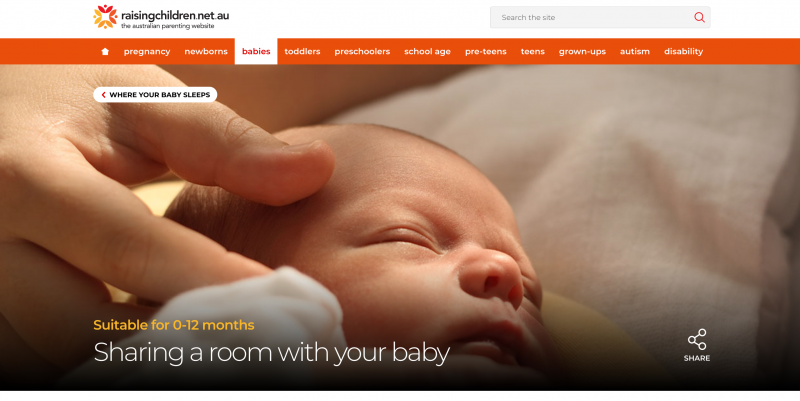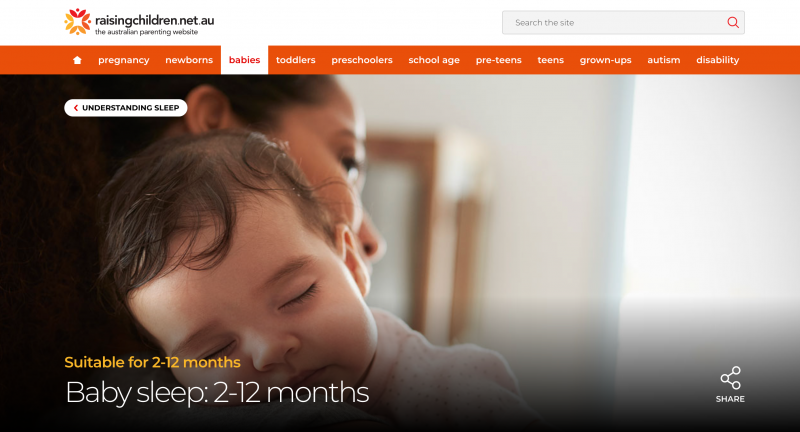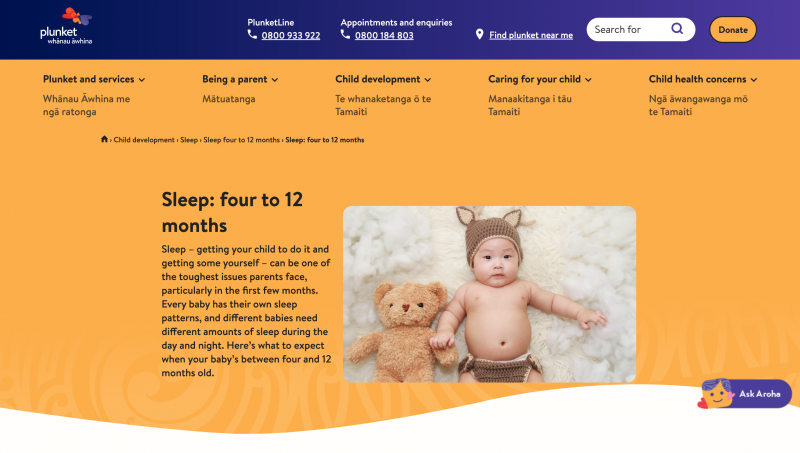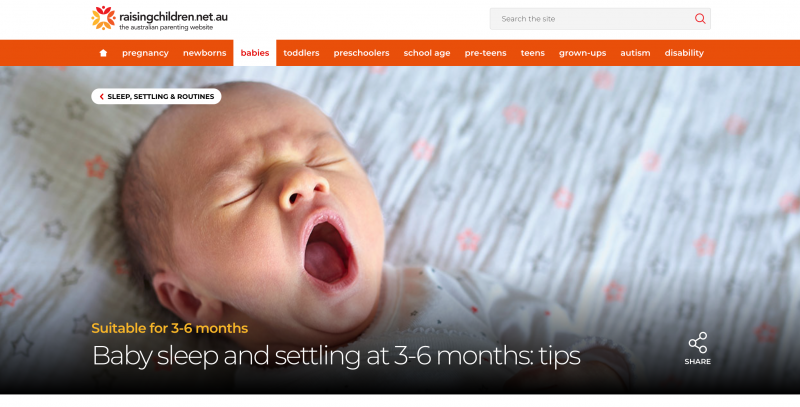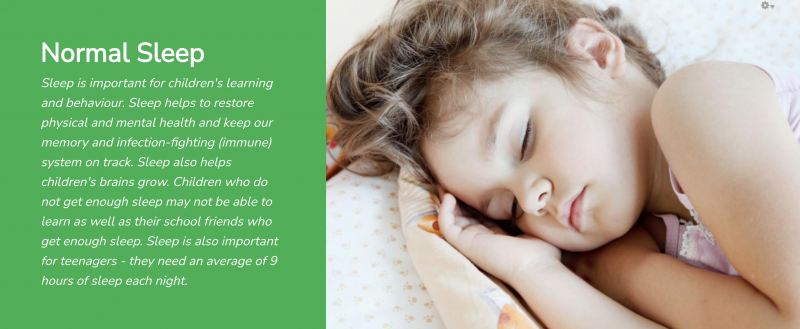Normal Sleep - Babies 3 To 12 Months
Normal Sleep - Babies 3 To 12 Months
Pēpi need sleep to grow and develop. Sleep needs vary and change as they grow. Your baby's sleep needs may differ from other babies their age. Knowing what to expect at each stage helps you understand their sleep needs as they grow.
Key points on sleep in babies aged 3 to 12 months
- most babies sleep for an average of 14 to 17 hours each day
- from around 3 months old babies start forming night and day sleep patterns
- most babies under 6 months still need feeding and help to settle at night
- as your pēpi starts to develop day and night sleep patterns, you can take steps to encourage more sleep at night
- if you have concerns about your baby's sleep, seek support from a trained healthcare professional
This page is about sleep in babies. It's part of a whole section on normal sleep.
Where should pēpi sleep?
Put pēpi in their own bed for every sleep (such as a cot, bassinet, wahakura or Pēpi-Pod®). Have your baby's bed in the same room as you for at least the first 6 months.
It is never safe to put pēpi to sleep in an adult bed, on a couch or on a chair.
Take a look at the KidsHealth safe sleep page to learn more about making the sleeping environment safe for pēpi.
You can find more information on the Raising Children website on sharing a room with your baby.
My baby's sleep - what to expect
From around 3 months, pēpi will start to develop day and night sleep patterns. As pēpi grows, they may sleep for less time, the typical amounts of sleep at each age are:
- around 3 months most babies still sleep for 14 to 17 hours each day
- from 3 to 6 months most babies sleep for 12 to 15 hours each day
- from 6 to 12 months babies sleep for around 11 to 14 hours each day
What sleep cycles do babies have?
As babies grow and develop their sleep cycles change. Pēpi over 3 months will have a sleep cycle that consists of:
- light sleep, when pēpi wakes easily
- deep sleep, when pēpi is sound asleep and very still
- dream sleep, when pēpi is dreaming
As babies get older, they will often sleep longer at night. Many babies will still wake in the night and will need to be settled back to sleep. They will often have 2 to 3 naps during the day that last roughly between 30 minutes and 2 hours.
From around 3 months pēpi will start to develop night and day sleep patterns. You can encourage this by emphasising the difference between day and night. At night keep the room darker and use dim light when attending to pēpi. Keep play and stimulation for the daytime.
What could be affecting my baby's sleep?
From about 6 months, pēpi will develop new abilities that may impact how they sleep. Settling difficulties can occur at the same time pēpi starts to crawl. Babies can develop separation anxiety where they get upset if you aren't around. This can make them wake up more overnight. Some babies will keep themselves awake if there is lots of noise and light around or something they find interesting.
Some tips on settling pēpi to sleep
The Raising Children website has great tips and ideas on how to help settle your baby to sleep.
In this short video by Raising Children, parents talk about encouraging baby to sleep. It includes looking for sleep cues, finding out what helps babies sleep, and being consistent with sleep and settling techniques. You might need to experiment to find out what works for your baby.
Will a bedtime routine help pēpi sleep?
A bedtime routine involves doing similar activities each night before pēpi goes to sleep. From around 6 months of age, having a bedtime routine can help pēpi to fall asleep more easily. A positive bedtime routine can help calm pēpi ready for sleep. This may include things such as:
- having a bath
- reading a story or singing songs
- having a cuddle
- saying goodnight and turning out the light
It is useful to try and keep your baby's bedtime and routine similar to help pēpi feel ready for sleep.
Putting babies to bed while they are still awake but drowsy can help them settle at the beginning of the night. It may also make it easier to settle them back to sleep if they wake in the night. If pēpi falls asleep in their cot, they will associate sleep with being in their cot instead of associating sleep with being rocked or fed.
Where can I get support?
The first few months of life with a newborn can be challenging. If you are struggling to settle pēpi or feel like they're not sleeping well, it is important to reach out for support.
PlunketLine
Call PlunketLine 24 hours a day, 7 days a week on 0800 933 922.
PlunketLine is available 24 hours a day for advice and support for you, your baby and your whānau. Calls are free from cell phones. You do not need to be registered with Plunket to use this service.
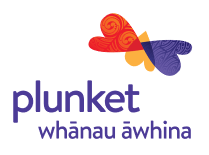
Call PlunketLine on 0800 933 922 for parenting advice.
Healthline
Call Healthline 24 hours a day, 7 days a week on 0800 611 116.
Healthline provides free advice to parents and whānau if they're worried pēpi may be unwell. They can help find services nearby such as an afterhours medical centre if you need to see a doctor.
Your GP or doctor
If you are worried that pēpi is unwell or showing signs of distress or pain, see your GP so they can check pēpi. You can also talk to your GP if you are needing extra support with adjusting to life with pēpi.
See more KidsHealth content on normal sleep at different ages
This page last reviewed 04 April 2023.
Do you have any feedback for KidsHealth?
If you have any feedback about the KidsHealth website, or have a suggestion for new content, please get in touch with us.
Email us now